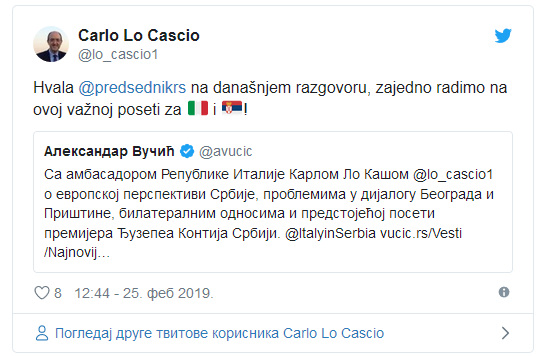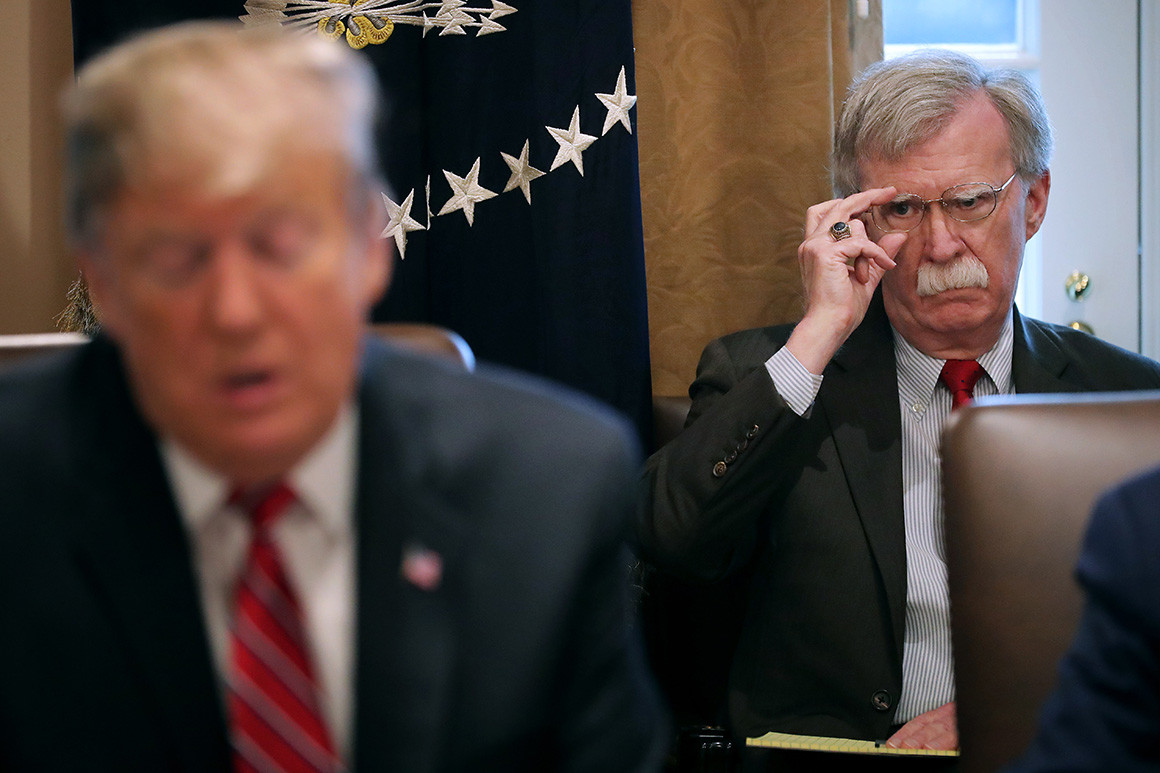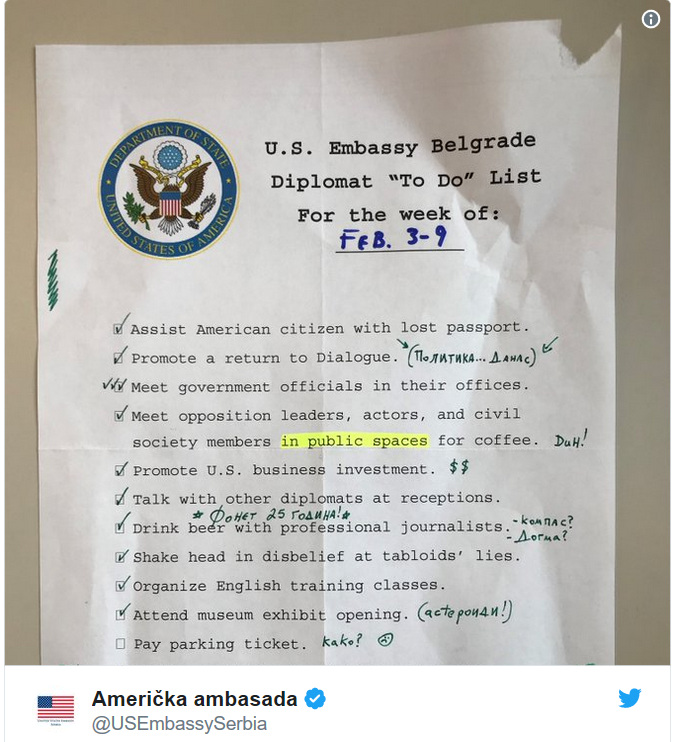You can’t ask Trump not to use Twitter
Oleg Shakirov, expert of the Center for strategic research and Russian International Affairs Council expert, tells PICREADI about digital diplomacy and how social media...
Trump’s Aides Are Imitating His Aggressive Twitter Diplomacy. The Results Are Mixed
President Trump threw out the diplomatic rule book when he took office, tweeting gleefully about sensitive global issues, be it the nuclear showdown with...
‘If nobody is listening, it is useless’: Trump admin’s social media campaign against Iran...
Jaws dropped at the State Department last November when President Donald Trump tweeted a "Game of Thrones"-style poster warning Iran that "Sanctions are coming."
The...
Italijanski ambasador poslao Vučiću poruku putem Tvitera
FOTO TANJUG/ ZORAN ZESTIC
BEOGRAD – Italijanski ambasador u Srbiji Karlo Lo Kašo poručio je putem Tvitera predsedniku Srbije da će zajedno sa...
Visual diplomacy is everyone’s job
A couple of months ago, I found myself in a classroom at the Foreign Service Institute with a dozen other trainees and a yogi.
It...
Let’s talk Digital Diplomacy
https://youtu.be/5m_ozCBGCJ4
A Look at Diplocamp 2019
uscpublicdiplomacy.org
Digital Diplomacy Conference #diplocampDutch Ministry of Foreign Affairs 🇳🇱 ✔@DutchMFAOn 7 February 2019, the Dutch Ministry of Foreign Affairs brought together 150 experts on tech, digital and international relations @NLatEU in Brussels. To discuss the challenges, share practical tools and design solutions around digital diplomacy.
Dutch Ministry of Foreign Affairs
✔@DutchMFA
Feb 8, 2019
USC Public Diplomacy@PublicDiplomacy#Diplocamp takes off! Which topic piques your interest? From #AI to #ImmersiveStorytelling to #ElectionIntegrity and much, much more, the future of #DigitalDiplomacy is here and we want to explore it all. #DigDiplo #PublicDiplomacy @DutchMFA @USC @USCAnnenberg #ascj #usc #PDWeek
Feb 7, 2019
Ziad Ramley
✔@ziadramleyThis was so much fun! Thanks to everyone at #DiploCamp who attended @NLinBEFeb 7, 2019
Vince Gonzales@VgonzalesUSCWhat a great day at the Digital Diplomacy Camp. Thank you to everyone at @PublicDiplomacy and all the particip..
Regime change by tweet? John Bolton hopes so
Eliana Johnson, Politico, 02/13/2019; ; see also
President Trump's national security adviser has become an unlikely social media star.
Image from article, with caption:John Bolton’s tweets have taken on a Trumpian quality, liberally incorporating exhortations and exclamation points. Chip Somodevilla/Getty Images
He is the unlikeliest social media star of the Trump administration.
At 70 years old, and in one of Washington’s most sensitive jobs, national security adviser John Bolton has started tweeting with the frequency, and often the passion, of his boss.
Trump’s third national security adviser is using Twitter far more often, and more colorfully, than any of his predecessors — making policy pronouncements and lambasting perceived bad guys. His targets range widely, from the Cuban government to Vladimir Putin’s Russia to the “failing” New York Times.
In recent weeks, he has trained his fire on the embattled socialist regime of Venezuela's Nicolas Maduro. On a single day in F..
Twitter’ng with diplomacy and its apps
Deriq Bernard, The Manila Times, February 10, 2019
image (not from article) from
Excerpt:
Twitter since 2012 has become the unofficial tool for diplomacy for many leaders. So much so that a social phenomena called “Twiplomacy” or “hashtag diplomacy,” has developed from the use of social network and microblogging websites. ...
[H]eads of state and their diplomats conduct diplomatic outreach and public diplomacy on Twitter. As this is happening, the diversity in diplomatic communications happens on the platform. Things from invitations to events, to calls for bilateral cooperation, to innovating to get the public into a discussion, and even town halls utilize Twitter. And in very undiplomatic terms, diplomats also use terse language to push or jab both of friends and enemies of the state. But based on Twitter reports, there are more friendly and casual posts than fiery speech. ...
Zvanični Tviter profil ambasade SAD u Srbiji našalio se
Zvanični Tviter profil ambasade SAD u Srbiji našalio se - mi bismo rekli: vrlo duhovito - sa pisanjem pojedinih dnevnih novina i sajtova o...



















